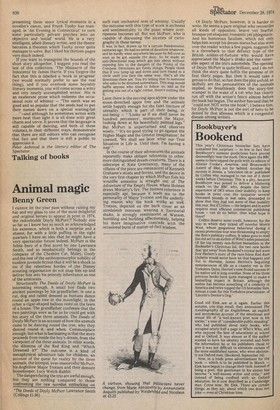Bookbuyeris
Bookend
This year's Christmas bestseller lists have contained few surprises — so few in fact that Bookbuyer's summer predictions have proved distressiggly near the mark. Once again the BBC seems to have topped the polls with its edition of Alistair Cooke's America, and Bronowski's Ascent of Man not far behind. Another big success is Jennie, a 'television tie-in' published by Collins who managed to run out of it three weeks before Christmas. This is a pity, because Bookbuyer was poised to deliver a blistering attack on the BBC who, despite the bitter experience of 1973 when their inability to keep books in print cost the taxpayer several thousand pounds in lost sales, proceeded to show that they had lost none of that inability this year. But if Collins — the largest and in some respects most efficient commercial publishing house — can do no , better, then what hope is there?
Collins deserve some credit, however, for the way in which they ticked off novelist Morris West, whose gregarious behaviour during a recent promotion tour was threatening to empty the firm's publicity coffers. It takes guts to read the riot act to an author of West's sales potential. Of the top twenty non-fiction bestsellers in the Bookseller's Christmas list, the two new books that 'got away' from Bookend's crystal ball were Ivor Herbert's story of the race-horse Red Runt (Juliette would never have let that happen) and Vet in Harness, James Herriot's beguiling reminiscences of life as a country vet in the. Yorkshire Dales. Het-riot's new-found success in his native soil is long overdue. None of his three previous books have quite managed to make a bestselling impact in Britain, although the author has become something of a celebrity in America and twice topped the US bestseller lists. Almost a case, for this Yorkshire practitioner, of 'Lincoln's Doctor's Dog.'
Good old Elek are at it again. Earlier this autumn, you may recall, they announced The Autobiography of an Englishman, an explicit and anonymous account of the emotional and sexual life of "a well-known poet now in his sixties," a man of "considerable public standing" who had published about sixty books, who occupied nearly half a page in Who's Who, and who enjoyed the best of educations at school and at Oxford. It was almost as if the author wanted to have his identity revealed and from the information he or his publishers chose to give it was not difficult to eliminate certain of the more established names, who were obviously not Oxford men. (Bookend, September 14). Now, in a trade press advertisement for the book — which is to be published in March — Elek have begun to change their tack, Instead of being a poet, this gentleman in his sixties has become "a well-known writer and critic," and instead of being credited with an Oxford education, he is now described as a Cambridge man. Come now, Mr Elek. There are certain things, as they say, about which one does not joke — even at Christmas time.














































 Previous page
Previous page